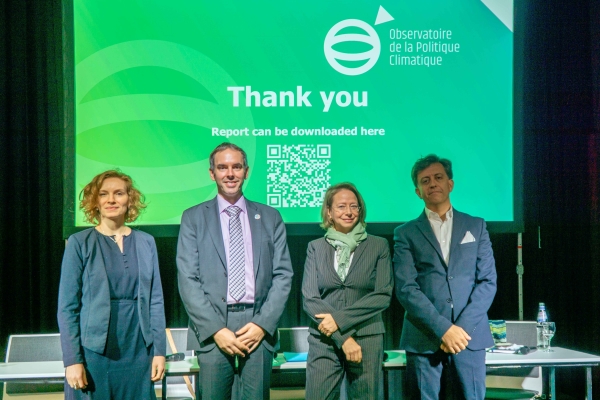 Credit: MECDD
Credit: MECDD
On Friday 7 October 2022, the Scientific Advisory Board on Luxembourg's climate policy published its first annual report and recommendations to achieve carbon-neutrality by 2050.
Luxembourg's climate law has set a target is to reduce its emissions by 55% by 2030 compared to 2005 and become climate-neutral by 2050 at the latest. The law also provides the legislative basis for the Observatory for Climate Policy (Observatoire de la politique climatique - OPC).
In its first annual report, the OPC defines guidelines for a quick and fair transition to a sustainable and emission-free society and gives first concrete recommendations on the need for action. The report welcomes many of the Luxembourg government's existing policies and measures, but also stresses that they need to be significantly strengthened.
The OPC recommends that Luxembourg follow three overarching guidelines for the necessary transition to a sustainable and decarbonised society:
1. Reducing dependency on fossil fuels
Traditionally, climate policy creates incentives for technological change. In addition, behaviuoral changes and profound structural changes in political, economic and social processes are necessary. In particular, good cooperation between different actors is needed, as the challenges are systemic.
The OPC groups the necessary measures into three pillars:
- Sufficiency: Do policies and measures encourage energy saving?
- Efficiency: Is energy use being optimized in relation to specific goals?
- Use of renewable energy and regeneration: Is the required energy obtained from renewable and CO2-neutral sources?
2. Just transition to climate-resilient development
The principle of distributive justice is relevant to all policies and measures. Important guiding questions for design and implementation are therefore: What costs, benefits and risks are associated with a policy? How are costs, benefits and risks distributed among people and specific stakeholders?
3. New and transformative governance
The necessary change requires a new and transformative governance: This means that not only the mix of political instruments but also the existing governance processes and structures have to be changed. These include, for example, participatory approaches such as town meetings or so-called citizen science projects.
In connection with the current energy crisis, the OPC makes two basic recommendations: First, subsidies for fossil fuels must be avoided as a matter of principle, as they counteract the necessary reduction in energy demand. Secondly, with a view to distributive justice, subsidies should only be used in a targeted manner, e.g. for low-income households or small and medium-sized businesses.
The complete report and further information on the OPC can be found on the website: https://environnement.public.lu/fr/klima-an-energie/opc.html.








